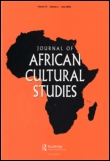
Journal of African Cultural Studies
Scope & Guideline
Charting New Territories in African Cultural Scholarship
Introduction
Aims and Scopes
- Cultural Performance and Expression:
The journal focuses on various forms of cultural performance, including music, dance, and oral traditions, exploring how these practices reflect and shape social realities in different African contexts. - Language and Identity:
A significant emphasis is placed on the intersection of language and identity, particularly in contemporary African hip-hop and other vernacular expressions, revealing how language serves as a site of cultural negotiation and resistance. - Social Movements and Politics:
The journal investigates the role of cultural practices in social movements, governance, and political expression, highlighting how art and performance contribute to civic engagement and activism. - Gender and Sexuality:
Research often delves into gender dynamics and sexual identities within African cultures, addressing the complexities of feminism, queer studies, and the representation of marginalized voices. - Postcolonial and Transnational Perspectives:
The journal encourages analysis through postcolonial and transnational lenses, examining how historical legacies shape contemporary cultural practices and identities across African societies.
Trending and Emerging
- Urban Cultural Practices:
There is a growing focus on urban cultural practices, particularly in relation to how cities shape identity and cultural expression. This trend highlights the interplay between urbanization and cultural production, particularly in areas like hip-hop and street food. - Decolonial Perspectives:
Emerging scholarship increasingly adopts decolonial frameworks, exploring how African societies can reclaim narratives and practices that were historically marginalized or misrepresented by colonial powers. - Digital Cultures and Media:
The rise of digital cultures, including social media and online performance, is a prominent theme, examining how these platforms influence cultural expression and identity formation among African youth. - Intersectionality in Gender Studies:
An emphasis on intersectionality has become apparent, with scholars exploring how race, class, and sexuality intersect in the context of gender, leading to more nuanced discussions of identity and representation. - Environmental and Ecological Narratives:
There is an emerging interest in ecological narratives and how cultural practices relate to environmental issues, reflecting a recognition of the importance of sustainability within African cultural discourses.
Declining or Waning
- Colonial Histories and Their Direct Narratives:
There has been a noticeable decrease in papers directly addressing colonial histories through traditional narratives, possibly as scholars seek more nuanced or contemporary approaches to understanding historical impacts. - Static Representations of African Cultures:
Research focusing solely on static representations of African cultures, without considering their dynamic and evolving nature, appears to be waning, as scholars increasingly recognize the necessity of contextualizing culture within contemporary frameworks. - Traditional Gender Roles:
Discussions centered on traditional gender roles, without engaging with contemporary shifts and challenges, have diminished, reflecting a broader recognition of the complexities surrounding gender in modern African societies.
Similar Journals
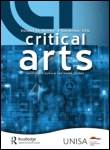
Critical Arts-South-North Cultural and Media Studies
Engaging with the Pulse of Global Cultural DiscourseCritical Arts-South-North Cultural and Media Studies is a distinguished academic journal published by Routledge Journals, Taylor & Francis Ltd, focusing on the interdisciplinary study of cultural and media dynamics in both southern and northern contexts. Established in 1980, the journal has grown to become a vital platform for scholars, professionals, and students interested in unpacking the complexities of culture, media, and communication across diverse sociopolitical landscapes. With an impressive Q1 ranking in Cultural Studies and a strong presence in the Q2 category for Arts and Humanities and Communication, the journal ranks favorably within Scopus metrics, reflecting its high-quality and impactful research contributions. Although it does not currently offer open access, its comprehensive reviews, articles, and discussions serve as an essential resource for advancing critical thought and fostering scholarly dialogue in the field. The journal encourages the submission of original research papers, theoretical essays, and critical commentaries that challenge conventional narratives and promote interdisciplinary approaches, making it a cornerstone for anyone engaging with media and cultural studies.

African Journal of Rhetoric
Transforming Discourse Through Diverse PerspectivesThe African Journal of Rhetoric, ISSN 1998-2054, is a leading publication dedicated to the study and advancement of rhetorical theory and practice within the African context. Published by the African Association of Rhetoric, this journal seeks to amplify diverse voices and perspectives, fostering critical dialogue and innovative research in the fields of communication, linguistics, and social sciences. With a commitment to promoting open discourse, the journal provides valuable insights into rhetorical strategies, cultural narratives, and their implications on society, making it an indispensable resource for researchers, professionals, and students alike. The journal is based in Cape Town, South Africa, an epicenter of cultural and intellectual exchange, and encourages submissions that explore the intersection of rhetoric and contemporary issues. As we embrace the evolving landscape of communication, the African Journal of Rhetoric aims to be a pivotal platform for scholarship that bridges local and global dialogues in the study of rhetoric.
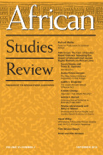
African Studies Review
Fostering Critical Discourse on Africa's Past and PresentAfrican Studies Review, published by Cambridge University Press, serves as a leading academic journal in the fields of Anthropology and Cultural Studies. With a prestigious Q1 classification in Cultural Studies and Q2 in Anthropology, it is recognized for its high impact within the scholarly community, boasting a Scopus ranking in the 83rd and 70th percentiles respectively. Established in 1962, this journal has consistently provided a platform for rigorous analysis and discourse, exploring the complexities of African societies, cultures, and histories through multidisciplinary perspectives. While currently not offering Open Access options, the African Studies Review remains vital for researchers, professionals, and students alike, as it delves into innovative research and critical discussions that shape the understanding of contemporary African issues. Its ongoing commitment to excellence makes it an indispensable resource for those invested in African scholarship.
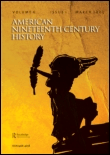
American Nineteenth Century History
Bridging Past and Present in American HistoryAmerican Nineteenth Century History is a distinguished academic journal dedicated to the exploration and critical analysis of the social, cultural, political, and economic dynamics of 19th century America. Published by ROUTLEDGE JOURNALS, TAYLOR & FRANCIS LTD, this journal serves as a vital resource for researchers and scholars interested in historical studies, bridging the gap between academia and broader historical discourse. Although it currently holds a Q4 categorization in History and ranks 997th out of 1760 in the Scopus Arts and Humanities field, it continues to make significant contributions by providing a platform for scholarly articles that delve into the complexities of this transformative era. With a commitment to fostering academic dialogue, American Nineteenth Century History is essential for those seeking to deepen their understanding of 19th century narratives and their implications in contemporary society. As the journal evolves through to 2024, it remains an indispensable tool for professionals, students, and enthusiasts aiming to engage with America's rich historical tapestry.

CLA JOURNAL-COLLEGE LANGUAGE ASSOCIATION
Connecting Educators and Researchers in Language and Literature.CLA Journal - College Language Association is a prominent academic journal dedicated to the exploration of language, literature, and education. Published by the College Language Association in the United States, this journal serves as an essential platform for researchers, educators, and students interested in the evolving landscape of language studies. With its coverage spanning from 2002 to 2020, CLA Journal has made significant contributions to the fields of Education, Linguistics, and Literature and Literary Theory, although its indexing in Scopus has been discontinued. The journal is categorized in the Q4 quartile for education and linguistics, indicating a niche but vital role in the academic community, while also achieving a Q3 ranking in literature. The journal occupies an essential space for those engaged in scholarly discourse, offering insightful perspectives and fostering dialogue across these interconnected areas of study.

INTERNATIONAL JOURNAL OF AFRICAN HISTORICAL STUDIES
Elevating African Historical Studies to Global DiscourseInternational Journal of African Historical Studies is a leading academic journal published by the African Studies Center at Boston University. With its ISSN 0361-7882 and E-ISSN 2326-3016, this journal serves as a vital platform for scholarly discourse in the fields of History, Cultural Studies, and Sociology. Renowned for its rigorous peer-reviewed research, the journal holds a commendable Q1 ranking in History and Q2 in Cultural Studies as of 2023, highlighting its influence and contribution to African historical scholarship. The journal has been published since 1976, consistently providing insightful analyses and critical research that engage with Africa's past and present, thereby enriching our understanding of global histories. Although it does not offer an open-access model, the journal is accessible through various academic databases and institutions. Its mission is to foster a deeper understanding of African histories by publishing high-quality, innovative research that reflects diverse perspectives, making it an essential resource for researchers, professionals, and students dedicated to the study of African history and cultural dynamics.
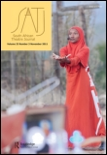
South African Theatre Journal
Unveiling Diverse Voices in Theatre ResearchSouth African Theatre Journal, published by Routledge Journals, Taylor & Francis Ltd, is an essential platform for researchers and practitioners in the fields of Visual Arts and Performing Arts. With an ISSN of 1013-7548 and an E-ISSN of 2163-7660, this journal has been contributing to the discourse on diverse theatrical practices and performance studies since its inception in 1996. The journal's focus encompasses a variety of topics, including but not limited to, South African theatre, intercultural performance, and the impact of socio-political contexts on artistic expression. Although it does not currently offer open access, its significance is reflected in its Q3 category in Visual Arts and Performing Arts and a ranking of #449/667 in the Scopus Arts and Humanities sector, positioning it as a noteworthy resource for scholars striving to explore and analyze the rich tapestry of theatrical work in South Africa. The South African Theatre Journal serves as a vital conduit for critical engagement and scholarly dialogue, making it indispensable for students, researchers, and professionals dedicated to the advancement of performing arts research.

MISSISSIPPI QUARTERLY
Navigating Interdisciplinary Landscapes in Literary StudiesMISSISSIPPI QUARTERLY, published by Johns Hopkins University Press, is a distinguished journal that delves into the realms of Cultural Studies and Literature and Literary Theory. Since its inception, the journal has served as a vital platform for scholarly exchange and critical analysis, making significant contributions to understanding literary and cultural phenomena through varied interdisciplinary approaches. With an ISSN of 0026-637X and an e-ISSN of 2689-517X, it operates without Open Access, ensuring a selective dissemination of high-quality research. Despite being positioned in the Q4 quartile based on the 2023 ranking, it maintains a unique appeal for researchers, professionals, and students seeking to navigate the complexities of culture and literature. The journal has converged its publishing years to remain relevant amid evolving academic discourses, ensuring that it continues to address contemporary challenges and themes in literature. As an important academic resource, MISSISSIPPI QUARTERLY promises to stimulate discussion and provoke thought, inviting new voices to contribute to the ongoing dialogue in these critical fields.
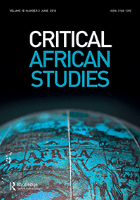
Critical African Studies
Exploring Africa's Complex NarrativesCritical African Studies, published by TAYLOR & FRANCIS LTD, is a premier journal dedicated to advancing the discourse on critical issues affecting Africa and its diaspora. With an ISSN of 2168-1392 and an E-ISSN of 2040-7211, this journal has established itself as a leading publication in the field of Arts and Humanities, ranked Q1 in Arts and Humanities (miscellaneous) and Q2 in Social Sciences (miscellaneous) as of 2023, showcasing its commitment to high-quality research. Over its converged years from 2015 to 2024, it has become a critical platform for scholars and practitioners to explore diverse perspectives, innovative ideas, and multidisciplinary approaches to issues such as social justice, governance, and cultural narratives within the African context. The journal's Scopus rankings reflect its significant impact, with impressive placements in both the Arts and Humanities and Social Sciences categories. Critical African Studies aims to foster a robust dialogue among researchers, professionals, and students, making it essential reading for anyone interested in the complexities of Africa's socio-political landscape and cultural heritage.

ENGLISH STUDIES IN AFRICA
Bridging Cultures through English StudiesENGLISH STUDIES IN AFRICA is a premier journal dedicated to advancing the field of literature and literary theory, published by Taylor & Francis Ltd, a leading name in academic publishing. With a focus on the intersection of English studies and African contexts, the journal has been a vital platform for over six decades, contributing to an enriched understanding of literary culture within the African diaspora from 1958 to 2024. While its impact factor is not explicitly listed, its Scopus rank of 146 out of 1106 journals in the category places it within the top 14% of its field, reflective of its significant scholarly contribution and rigorous peer-review process. As an essential resource for researchers, professionals, and students alike, ENGLISH STUDIES IN AFRICA fosters critical dialogue and interdisciplinary collaboration, making it a cornerstone for ongoing literary exploration and research in the region.